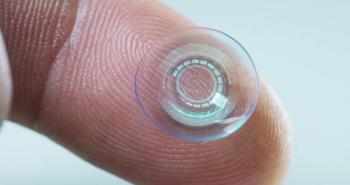
Oral zervimesine reduced GA lesion growth in phase 2 study from Cognition Therapeutics
Topline results from the MAGNIFY phase 2 clinical trial of oral zervimesine show 28.6% slower geographic atrophy lesion growth compared with placebo.
Cognition Therapeutics reported top-line results for the phase 2 MAGNIFY trial of the oral medication zervimesine intended to slow lesion growth in patients with
“To date, we have observed evidence of robust slowing of disease progression with zervimesine treatment in Phase 2 studies in Alzheimer’s disease and dementia with Lewy bodies,” Anthony O. Caggiano, MD, PhD, Cognition Therapeutics’ chief medical officer and head of research and development, said in a press release. “These results in dry AMD represent yet another indication in which zervimesine has potential to slow the progression of disease with a once-daily oral pill. Compared to current treatment options, which require regular clinic visits for intravitreal injections, an effective oral treatment that patients can take at home would be truly transformative.”
The MAGNIFY phase 2 study concluded after approximately 100 participants were enrolled, despite the trial’s intended enrollment of 246 patients. The double-masked, placebo-controlled clinical trial randomly assigned patients to be dosed with either 200 mg of once-daily oral zervimesine or placebo. Of the 100 enrolled patients, approximately two-thirds (~66 patients) completed 12 months of dosing and one-third (~33 patients) completed 18 months. Patients were evaluated for safety, tolerability, changes in GA lesion size, lesion growth rate, changes in visual acuity, and additional anatomic and visual measures.
Investigators reported that a slope analysis showed that in patients treated with zervimesine, the trajectory of GA lesion growth rate slowed by 28.6% at 18 months. Additionally, the mean lesion size was 28.2% smaller in patients treated with zervimesine compared with lesions in patients in the placebo group (Figure 1).
In a press release, Cognition Therapeutics said the top-line results compare favorably with published data for FDA-approved injectable complement inhibitors (Syfovre, Apellis Pharmaceuticals; Izervay, Astellas Pharma).
“Dry AMD is now the third indication in which we have shown efficacy signals with a once-daily oral drug,” Lisa Ricciardi, Cognition Therapeutics’ president and CEO, said in a press release. “We believe zervimesine has the potential to be used as a monotherapy or in combination with existing medications. This would allow physicians the flexibility to tailor treatment regimens for their patients. Importantly it would also allow patients who are not appropriate for injectables to have access to treatment. With the right partner and development plan, we believe zervimesine could be a treatment breakthrough in these large, underserved diseases.”
The company said in a press release that the voluntary conclusion of the MAGNIFY study before fulfilling its enrollment goal has allowed the company to use its resources for ongoing programs in the Alzheimer disease and dementia with Lewy bodies pipeline.
At this time, only top-line results are published. Cognition Therapeutics will publish additional data, such as safety, demographics, and visual and anatomic outcomes, at an unreported later date. Cognition indicated its intention to submit complete findings for presentation at a medical meeting later in 2025.
Reference
Cognition Therapeutics reports topline results showing oral zervimesine (CT1812) reduced lesion growth in phase 2 study in geographic atrophy. Cognition Therapeutics. Press release. May 8, 2025. Accessed May 8, 2025.
Newsletter
Want more insights like this? Subscribe to Optometry Times and get clinical pearls and practice tips delivered straight to your inbox.















































